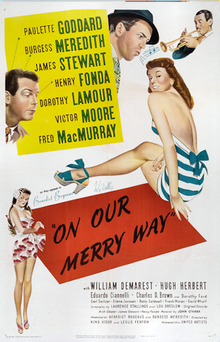
ON OUR MERRY WAY
US, 1942, 107 minutes, Black and white.
Burgess Meredith, Paulette Goddard, Fred Mac Murray, Hugh Herbert, James Stewart, Dorothy Lamour, Victor Moore, Henry Fonda, William Demarest.
Directed by King Vidor-and Leslie Fenton.
On Our Merry Way (Miracles Can Happen) is a collection of short stories. Typical enough of the '40s, it seems very much of that period. The stories are flimsy, but enjoyable. The framework focuses on Burgess Meredith as a reporter, given a question by his wife, Paulette Goddard. The first story is an interesting opportunity to see James Stewart and Henry Fonda working together. Harry James is a guest.
However, the second story with Dorothy Lamour and Victor Moore, is enjoyable as a send-up of Dorothy Lamour's sarong image which she does very cheerfully.
The third story is a variation on O. Henry's The Ransom of Red Chief (filed for the 1952, Full House) with Fred Mac Murray, William Demarest and F. Hugh Herbert. There is a simplistic happy ending - Just the thing for 1ight entertainment. The stories are from Arch Obeler and directed by King Vidor and Leslie Fenton.
1. The title of the film - and its alternate final words to the audience? 40s optimism and hope, good nature? Enjoyable short stories?
2. The two directors, the enjoyment of seeing the various star turns?
3. The '40s, black and white photography, the city, the country, the musical score? Serious and spoof? The send-up of Hollywood? The genres? O. Henry? American newspapers?
4. Oliver and Martha: Burgess Meredith and his taking the audience into his confidence? Waking up, going to work, the happily married couple, the hopes for the day, the painting and the job at the office The contrast with Oliver's reality, the lost and found dogs? His plan, the gambling debts catching up with him? The strong man chasing him throughout the film? Martha's question about the influence of a child? The interview with the boss and his pretence, his going out into the streets, the three main stories and his listening, running from the strong man, in the Hollywood studio? Exposed back at the office, his forthright reaction to get the editor to read them? Going home, the furniture going? Martha's question about their own baby? The editor's arrival and the happy ending?
5. The Henry Fonda- James Stewart story: the two lanky band members playing, their instruments, songs? Travelling and the broken-down bus, the need for money? The encounter with the mayor's son and his inability to play? The talent quest on the pier? The garage man's daughter and her brilliant playing, swimsuit? The quest, Harry James' arrival? The satire an the various inept players? The mayor's son and Henry Fonda playing for him under the floor, the garage man rocking the boat and the dreadful performance? The girl winning? Her taking over the band - the happy ending?
6. Dorothy Lamour and her glamour, telling her story, the child star and her performance and obnoxious behaviour, Victor Moore and his doddery screen persona, being sacked, the corny East Indies scene - and Dorothy Lamour's awkwardness with the typewriter? The child's tantrum? Her being told off, coming to say she was sorry? Arranging for the audition of the scene -another corny scene, Victor Moore's hamming it up, Dorothy Lamour's screen image, her success, Moore as her manager, the song in which she sent up Hollywood and her sarong image?
7. The Fred Mac Murray story: two men released from jail, going to Miami, encountering Sniffles, his tough guy image, taking then to the mine, the practical Jokes he played on then, threatening then with the police? Going to the uncle, his exasperation with his nephew? The attractive niece? Bringing Sniffles home with the pony, going to work for the uncle? The ending - and their all being part of the magician's act? The satire on the buddy gamblers?
3. The editor, getting out the paper, exasperation with Oliver, reading his material and giving him the job?
9. Humorous foibles, faith in human nature?